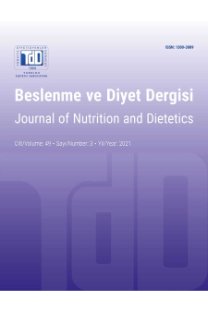Üniversite Öğrencilerinin Öğün Düzenleri ve Beslenme Eğitiminin Beslenme Bilgisine Etkisi
Meal Patterns of University Students and the Impact of Nutrition Education on their Nutritional Knowledge
___
- 1.Baysal, A. Beslenme. 9. Baskı, Ankara. 15. Baskı, Ankara, Hatiboğlu Yayınları; 2014.
- 2.Jonides L, Bushbacher MS, Barlow SE. Management of child and adolescent obesity: pyschological, emotional and behavioral assessment. Pediatrics 2002;110:215-221.
- 3.Kutluay-Merdol T. Çocuk ve ergen obezitesinde beslenme eğitiminin temelleri. (Eds: Baş, M ve Kızıltan, G). Çocuk ve Ergenlerde Ağırlık Yönetimi, Ankara, Başkent Üniversitesi 2011:293-302.
- 4.Kutluay-Merdol T. Beslenme Eğitimi Rehberi. 2. Baskı.Ankara, Hatipoğlu Yayınları; 2012.
- 5.Nelson MC, Story M, Larson NI, Neumark-Sztainer D,Lytle L A. Emerging adulthood and college-aged youth:an overlooked age for weight-related behavior change. Obesity 2008;16(10):22052211.
- 6.Ayaz S, Tezcan S, Akıncı F. Hemşirelik Yüksekokulu öğrencilerinin sağlığı geliştirme davranışları. C.Ü.Hemşirelik Yüksekokulu Dergisi 2005;9(2):26-34.
- 7.Vançelik S, Gürsel-Önal S, Güraksın A, Beyhun E. Üniversite öğrencilerinin beslenme bilgi ve alışkanlıkları ile ilişkili faktörler. TAF Prev Med Bull 2007;6(4):242-248.
- 8.Sovyanhadi M, Cort MA. Effectiveness of various nutrition education teaching methods for high school students: a case study in Alabama, United States. Malays J Nutr 2004;10(1):3137.
- 9.Hallal PC, Andersen LB, Bull FC, Guthold R, Haskell W, Ekelund U. Global physical activity levels: surveillance progress, pitfalls, and prospects. Lancet 2012;380(9838):247257.
- 10.Baric IC, Satalic Z, Lukesic Z. Nutritive value of meals, dietary habits and nutritive status in Croation university students according to gender. Int J Food Sci Nutr 2003;54:473-484.
- 11.Demory-Luce D, Morales M, Nicklas T, BaranowskiT, Zakeri I, Berenson G. Changes in food groupconsumption patterns from childhood to young adulthood: The Bogalusa Heart Study. J Am Diet Assoc 2004;104:1684-1691.
- 12.Gan WY, Mohd MTN, Zalilah MS, Hazizi AS Differences in eating behaviours, dietary intake and body weight status between male and female Malaysian University students. Malays J Nutr 2011;17(2):213228.
- 13.Abdull Hakim NH, Muniandy ND, Danish A.Nutritional status and eating practices among universitystudents in selected universities in Selangor, Malaysia. Asian J Clin Nutr 2012;4(3):7787.
- 14.Önal AE, Gürtekin B, Özel S, Erbil S, Ayvaz Ö,Güngör G. Tıp fakültesi öğrencilerinin beslenme alışkanlıkları ve besin tüketim sıklıkları. İst Tıp Fak Derg 2013;76(2):25-30.
- 15.Korkmaz NH. Uludağ Üniversitesi öğrencilerinin spor yapma ve beslenme alışkanlıklarının incelenmesi. Uludağ Üniversitesi Eğitim Fakültesi Dergisi 2010;23(2):399-413.
- 16.T.C. Sağlık Bakanlığı. Türkiyeye Özgü Beslenme Rehberi. 2. Baskı. Ankara, 2004.
- 17.Filiz K, Demir M. Beden eğitimi ve spor yüksekokulunda okuyan öğrencilerin, barınma ve beslenme durumlarının araştırılması. Gazi Üniversitesi Kırşehir Eğitim Fakültesi 2004;5(2):225-234.
- 18.Özdoğan Y, Yardımcı H, Özçelik AÖ. Yurtta Kalan Üniversite Öğrencilerinin Beslenme Alışkanlıkları. Karadeniz 2012;4(15):139-149.
- 19.Jacoby E, Cueto S, Poitt E. When science and politics listen to each other: goo prospects from a ew school breakfast program in Peru. Am J Clin Nutr 1998;67 Suppl:795-797.
- 20.Kolodinsky J, Harvey-Berino JR, Berlin L, Johnson RK, Reynolds TW. Knowledge of current dietary guidelinesand food choice by college students: better eaters have higher knowledge of dietary guidance. J Am Diet Assoc 2007;107(8):14091413.
- 21.Hasheminia T, Çalışkan D, Işık A. Ankarada yükseköğretim öğrenci yurtlarında kalan öğrencilerin beslenme sorunları. İbni Sina Tıp Dergisi 2002;7:155-167.
- 22.Mazıcıoğlu M, Öztürk A. Üniversite 3 ve 4. sınıf öğrencilerinde beslenme alışkanlıkları ve bunu etkileyen faktörler. Erciyes Tıp Dergisi 2003;25(4):172-178.
- 23.Orak S, Akgün S, Orhan H. Süleyman Demirel Üniversitesi öğrencilerinin beslenme alışkanlıklarının araştırılması. S.D.Ü. Tıp Fak. Derg 2006;13(2):5-11.
- 24.Yılmaz E, Özkan S.Üniversite öğrencilerinin beslenme alışkanlıklarının incelenmesi. Fırat Sağlık Hizmetleri Dergisi (FSHD) 2007;2(6):87-104.
- 25.Ruxton CHS, Kirk TR. Breakfast: a rewiev of associations with measures of dietary intake, physiology and biochemistry. Br J Nutr 1997;78:199-213.
- 26.Preziosi P, Galan P, Deheeger M, Yacouth N, Drenowski A. Breakfast type daily nutrient intakes and vitamin and mineral status of French children, adolescents and adults. Am J Clin Nutr 1999;18(2):171178.
- 27.Budak N, Özer E, Kovalı S, İnceiş N. Kahvaltının öğrencilerin beslenmesine katkısı ve akademik başarıya etkisi. Beslenme ve Diyet Dergisi 2005;32(1):47-54.
- 28.Sevindi T, Yılmaz G, İbiş S, Yılmaz B. Gazi Üniversitesi Beden eğitimi ve Spor Yüksek Okulu öğrencilerinin beslenme ve kahvaltı alışkanlıklarının değerlendirilmesi. TSA 2007;11(3):77-90.
- 29.Özdoğan Y, Yardımcı H, Özçelik AÖ, Sürücüoğlu MS. Üniversite öğrencilerinin öğün düzenleri. Gazi Üniversitesi Endüstriyel Sanatlar Eğitim Fakültesi Dergisi 2011;29:66-74.
- 30.Richards A, Kattelmann KK, Ren C. Motivating 18- to 24-year-olds to increase their fruit and vegetable consumption. J Am Diet Assoc 2006;106(9):14051411.
- 31.Ha EJ, Caine-Bish N. Effect of nutrition intervention using a general nutrition course for promoting fruit and vegetable consumption among college students. J Nutr Educ Behav 2009;41(2):103109.
- 32.Ha EJ, Caine-Bish N. Interactive introductory nutrition course focusing on disease prevention increased whole-grain consumption by college students. J Nutr Educ Behav 2011;43(4):263267.
- 33.Azizi M, Rahmani-Nia F, Malaee M, Malaee M, Khosravi N. A Study of nutritional knowledge and attitudes of elite college athletes in Iran. Brazilian Journal of Biomotricity 2010;4(2):105-112.
- 34.Şanlıer N, Konaklıoğlu E, Güçer E. Gençlerin beslenme bilgi, alışkanlık ve davranışları ile beden kütle indeksleri arasındaki ilişki. Gazi Eğitim Fakültesi Dergisi 2009;29(2):333-352.
- ISSN: 1300-3089
- Yayın Aralığı: Yılda 3 Sayı
- Başlangıç: 1972
- Yayıncı: Türkiye Diyestisyenler Derneği
Beslenme ve Diyet Dergisi 2014: Genel Değerlendirme
Hemodiyaliz Hastalarında Obezitenin Beslenme Durumu ve Biyokimyasal Parametreler Üzerine Etkisi
MEVLÜDE KIZIL, FATMA GÜLHAN SAMUR
Kistik Fibrozisli Hastalarda Malnütrisyon ve Beslenme Durumunun Saptanması
Hatice AKBIYIK, HÜLYA GÖKMEN ÖZEL, NAGEHAN EMİRALİOĞLU, Gülden KÖKSAL, Elmas Ebru YALÇIN GÜNEŞ, Deniz DOĞRU ERSÖZ, Hayriye UĞUR ÖZÇELİK, Nural KİPER
Yetişkinlerde Tuz Eşiği, Antropometrik Ölçümler ve Kan Basıncı Arasındaki İlişkinin Saptanması
Aslıhan DEMİR, Didem GENÇAL, Kübra EŞEN, Neşe GÜLSATAN, Duygu DÖNER, Berna ARSLAN, Elif İNAN, DERYA DİKMEN
Diabetes Mellitus ve Oksidatif Stres
Hipertansiyonun Önlenmesi ve Tedavisinde Beslenme: Güncel Yaklaşımlar
Hemodiyaliz Hastasında İntradiyalitik Parenteral Beslenme: Bir Olgu Sunumu
Polikistik Over Sendromu Tedavisinde İnositol Desteği
İnflamatuvar Bağırsak Hastalıkları ve Anemi İlişkisi
HAVVANUR YOLDAŞ İLKTAÇ, MENDANE SAKA
Üniversite Öğrencilerinin Öğün Düzenleri ve Beslenme Eğitiminin Beslenme Bilgisine Etkisi
